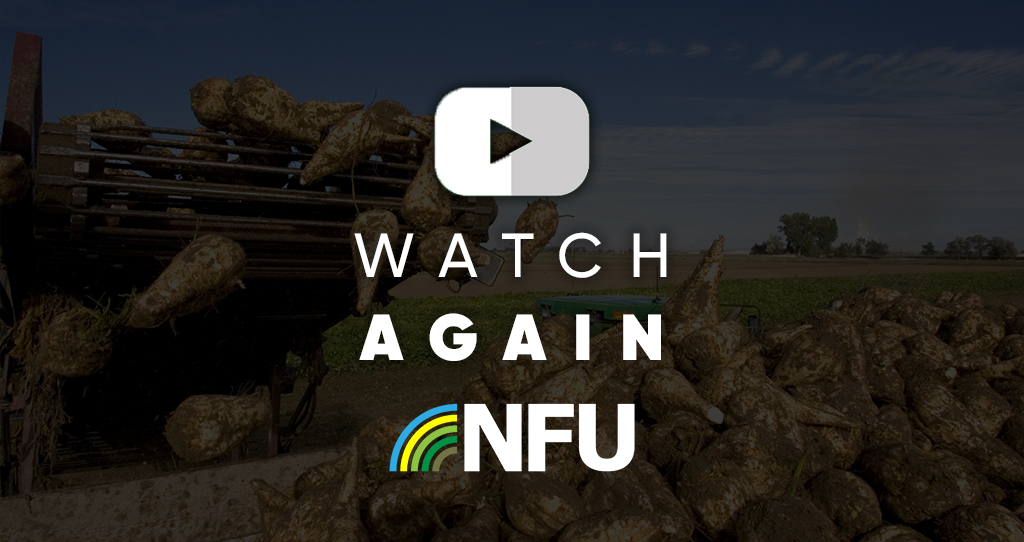Participants had the opportunity to hear about cutting edge research in the sector and to pose questions to the panel about what net zero means for their business.
The event was run as part of Countryside COP 2021.
Key findings from the session
A strong business case
NFU Sugar board member Tom Clarke discussed the decisions he'd made on his farm in the Fens near Ely, which has peaty soil.
- He does not use nitrogen on the farm’s sugar beet crop (soil type allows)
- He stopped ploughing ahead of sugar beet, routinely (soil type allows)
- He returns the sugar beet tops to the soil
Tom said: “All of these decisions will have reduced my sugar beet crop’s carbon footprint, but I didn’t make them to be green. I made them because it makes my business better, by either lowering my costs, reducing the complexity of field operations, or improving soil conditions so I get better crops in the future. Going green is not a sacrifice, it makes business sense."
Sugar beet a good carbon sink
Dr Iain Gould, senior lecturer in soil science at LIAT, said: “At the field-scale, we have installed a carbon flux tower in a sugar beet field at the University of Lincoln to measure the carbon coming down into the crop and going up into the atmosphere. It is on a limestone brashy soil.
"The initial data shows that sugar beet is a net source of carbon from May to mid-June, but from mid-June up to the latest data available in September, it is a significant carbon sink. The crop is due to be harvested in December. We are building up the data set and intend to research the impact of different soil types on carbon sequestration as early indications suggest that sugar beet takes up carbon for longer in a season than other crops”.
Pipeline projects
Dr Barratt, applied crop scientist at BBRO, stated: “The BBRO is collaborating with Dr Gould to consider future projects, such as analysing the impact of different on-farm management practices, in order to quantify the carbon savings that are possible. There is an opportunity for the sugar beet industry to work together to try to achieve net zero as soon as possible to make British beet sugar something to be proud of”.
Top tips to increase efficiency and reduce emissions
- Use fertiliser placement where possible
- Minimise passes on land where possible
- Lift crop in the right conditions (weather depending) to reduce soil tare and to reduce soil compaction
- Return sugar beet tops to the soil
- Keep an eye on the BBRO website for latest research in this area.
Watch the event again here
Speaker line-up
Tom Clarke farms beside the River Lark in the Cambridgeshire Fens, near the Cathedral City of Ely. He farms approximately 1,000 acres growing milling wheat, sugar beet, potatoes, and other crops such as linseed, with more than 15% of the farm dedicated to improving nature. Tom was elected to the NFU Sugar board in 2020 and is the board’s net zero lead sitting on the NFU’s net zero strategic advisory group guiding the NFU’s 2040 net zero strategy.
Dr Iain Gould is a senior lecturer in soil science at the Lincoln Institute for Agri-food Technology (LIAT) at the University of Lincoln. His research interests have an applied focus, and broadly explore how soils in arable systems can adapt to a changing climate. Current projects include soil resilience to flooding, brackish irrigation and soil health, and recently carbon monitoring and agri-robotic assessment of soils. Iain also supports BASIS professional development courses at the university, delivering training on soil and water management, quality of soils and FACTS.
Dr Georgina Barratt is an applied crop scientist at BBRO. She completed her PhD at the University of Nottingham focusing on water use efficiency of sugar beet. In addition to water use and drought, Georgina has developed an interest in carbon and net zero and will be undertaking research projects in this area. Alongside research she undertakes a range of knowledge exchange activities at BBRO and enjoys translating scientific findings into practical on farm advice.
